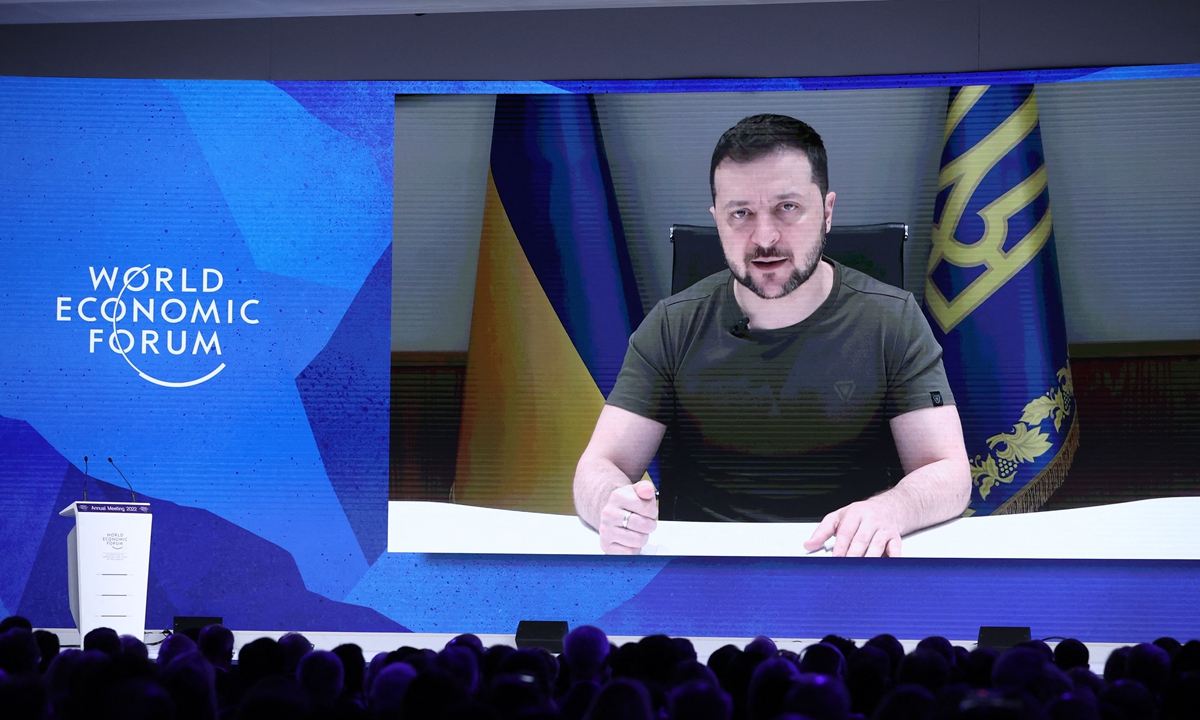Ukraine tops Davos agenda as supporting Kiev becomes new ‘political correctness’ in West, but ‘divergences widen’

Ukrainian President Volodymyr Zelensky attends World Economic Forum annual meeting via video conference in Davos, Switzerland on May 23, 2022. Photo: AFP
Ukraine is topping the agenda of the World Economic Forum (WEF) at Davos where Ukrainian President Volodymyr Zelensky demanded more assistance and the firmer isolation of the Russian economy in an address on Monday, the day when Western defense chiefs meet virtually to discuss further military aid to the country in a prolonged military conflict with Russia.
Supporting Ukraine, the new "political correctness" of the West, has hijacked Davos and depleted EU weapon stocks, observers said, predicting the exposed divergences inside the "Western bloc" will grow wider as the Russia-Ukraine conflict lingers.
Zelensky used the Davos forum on Monday to appeal for more weapons for his country and "maximum" sanctions against Moscow. Addressing a session of Davos via videolink, he called for an oil embargo on Russia, sanctions on all its banks and an end to all trade with the country, media reported.
Also on Monday the Ukraine contact group, comprised of mainly Western defense chiefs led by US Defense Secretary Lloyd Austin, reconvened to enhance military support to Ukraine after Austin discussed "Ukrainian requirements" with his Ukrainian counterpart Oleksii Reznikov last week.
Ukraine has been continuously asking for heavy weapons, including long-range rocket launchers which the US had resisted.
US President Joe Biden signed on Saturday during his Asia trip an additional $40 billion for Ukraine, half in military form, after the bill got bipartisan support and passed an overwhelmingly majority in the US Congress.
Lü Xiang, a research fellow at the Chinese Academy of Social Sciences, told the Global Times on Monday that the US has been active in fueling the Russia-Ukraine conflict from the very beginning and Europe is dancing to the US' tune of "values."
The US will spend money to have NATO forces help train soldiers and supply weapons to Ukraine while the money will go to NATO forces in Europe, which are predominantly US', and Lü dubbed the model as "from the left to the right pocket."
The US is also mobilizing transatlantic allies to supply in-service weapons to Ukraine, but Europe hedged such aid. Transportation to Ukraine remains the biggest problem -- weapons are piling up at the Poland-Ukraine border, the expert said.
The EU on Wednesday urged member countries to quickly replenish their "depleted stocks" of ammunition and military equipment, and offered financial incentives to those willing to work together to replace materiel sent to Ukraine.
But that was too idealistic and too heavy an economic burden for the bloc, observers said, as supporting Ukraine is political correctness in Western values, but support of what magnitude is a real question of interests.
Besides military, conflicts in interests are increasingly blatant in the political and economic fields.
Finland and Sweden's accession to NATO was slowed down amid Turkish opposition and Ukrainian demands to join EU have been implicitly declined -- France's Europe minister said on Sunday France sees no EU entry for Ukraine in "15 to 20 years."
Polish Prime Minister Mateusz Morawiecki said on Sunday Norway should share the "gigantic" profits it has recently made as a result of higher oil and gas prices, especially with Ukraine. Morawiecki noted that profits from oil and gas this year for Norway, "a small country of five million [people], will be over €100 billion" higher than in recent years, according to news portal Notes from Poland.
Despite sweeping Western sanctions imposed on Russia over the past months, Russian gas is running via the complex network to the western end of the continent, except countries including Bulgaria, Poland and Finland which refused to pay in rubles.
The difficult issue of Russian gas and oil embargo tells the complexity of intertwined interests beyond the battlefield, Lü said. "The staunch support for Ukraine by Poland, a NATO member, has given Zelensky the illusion that the West would support him unswervingly at whatever cost, but Poland may have its own calculations," the expert said.
Poland and western Ukraine are traditionally close to each other, and the possibility exists that Poland wants to yield as much interests as possible from the crisis, Lü said.
The Wall Street Journal published an opinion piece by Ralph Gert Schöllhammer, an assistant professor at Webster Vienna Private University, that the EU, built with France and Germany at its center, is cautious of a competing Warsaw-Kiev axis if Ukraine enters the bloc.

